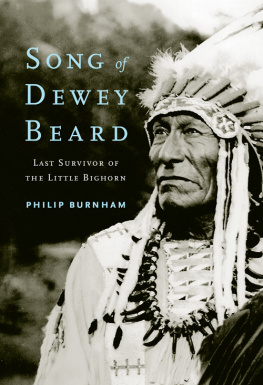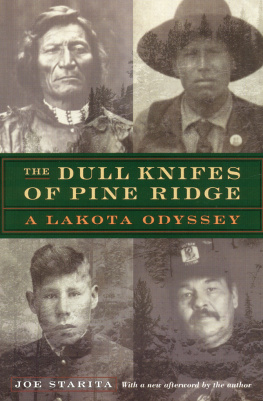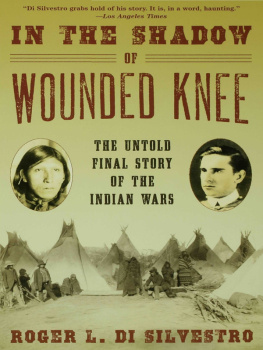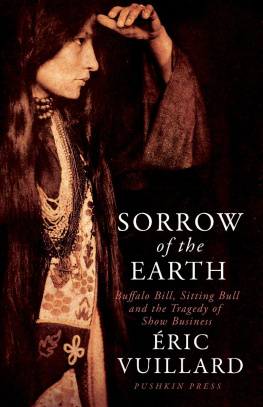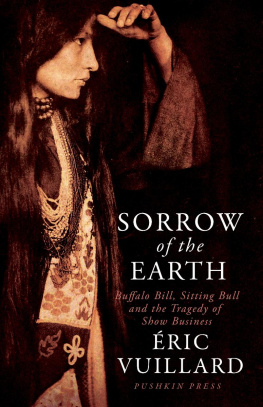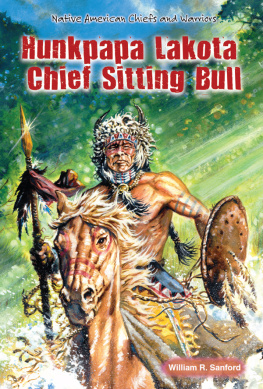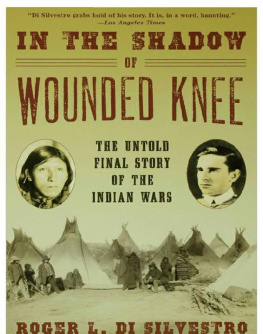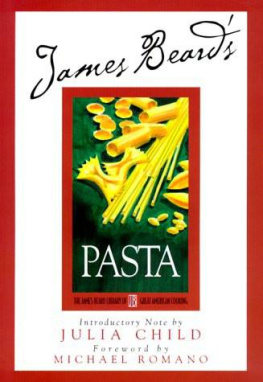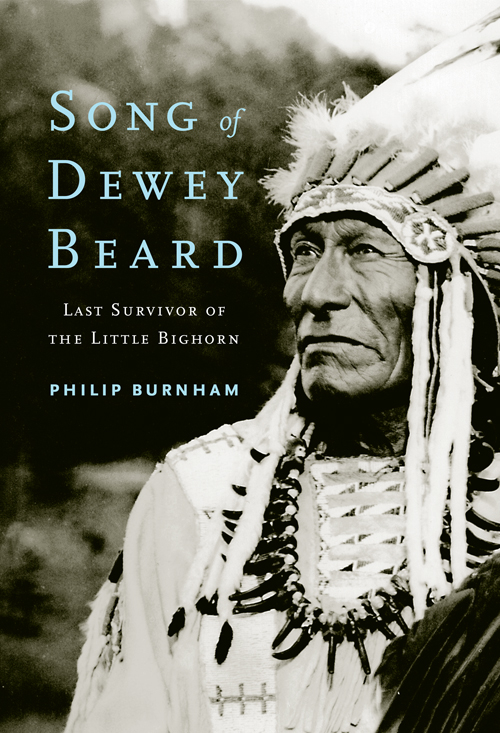
The remarkable Dewey Beard was a man who seemed to live foreverold enough to have fought at the Little Bighorn in 1876, its last survivor when he finally died in 1955. What the old-time Lakota were like, and what they lived through in those seventy years, is the subject of Philip Burnhams original, bracing, touching, surprising, and vigorously written book. Take note; this is something we have never seen before: a serious, and sometimes funny, and often dramatic, and always interesting account of a Lakota life after the buffalo were gone. Thats where the story usually stops. Burnham lets Beard tell us what happened next.
Tom Powers, author of The Killing of Crazy Horse
By scouring the archives and conducting personal interviews, Philip Burnham has helped clarify the historical record, teasing out new information and dispelling lingering myths. Song of Dewey Beard is a thoroughly researched, well-written, and engaging book.
Akim Reinhardt, author of Ruling Pine Ridge: Oglala Lakota Politics from the IRA to Wounded Knee

Song of Dewey Beard
Last Survivor of the Little Bighorn
Philip Burnham
University of Nebraska Press | Lincoln and London
2014 by Philip Burnham
All rights reserved
Cover image by Bill Groethe
Publication of this volume was assisted by a grant from the Friends of the University of Nebraska Press.
Library of Congress Cataloging-in-Publication Data
Burnham, Philip
Song of Dewey Beard: last survivor of the Little Bighorn / Philip Burnham.
pages cm
Includes bibliographical references and index.
ISBN 978-0-8032-6936-1 (cloth: alk. paper)
ISBN 978-0-8032-6941-5 (epub)
ISBN 978-0-8032-6942-2 (mobi)
ISBN 978-0-8032-6940-8 (pdf)
1. Dakota IndiansSouth DakotaBiography. 2. Little Bighorn, Battle of the, Mont., 1876Biography. 3. Dakota IndiansWars, 1876. 4. Wounded Knee Massacre, S.D., 1890Biography. 5. Dakota IndiansWars, 18901891. 6. South DakotaBiography. I. Beard, Dewey. II. Title.
E 99. D 1 B 93 2014
973.8'2092dc23
[B]
2014017332
The publisher does not have any control over and does not assume any responsibility for author or third-party websites or their content.
For Michele
Contents
Maps
Photographs
Most biographies are written about people who are already famous: generals and actors, outlaws and artists, presidents and popes. But Dewey Beards achievement is different. Youd be hard pressed to find an essay about him, much less a movie or a book. Thats because his life was both epic and quiet, a man better remembered for what he endured than what he wrote, for what he saw than what he said. He was a warrior turned peacemaker, a survivor turned showman, an old man who outlived all of his children. In some ways his story is a representative one for a century of Plains Indian life. But his personal journey was an extraordinary saga by any measure.
When I found Dewey Beard, he was buried in an unmarked grave. There were no books about him. He didnt leave any letters to speak of, and most of the elders who knew him were gone. One day a local church official, in response to my questions about the old man, said sadly, Youre ten years too late.
I didnt believe him. I had taught years before in Lakota country, and I knew something about the people who lived there and how they respect the ancestors. Though not Lakota, or even Indian, I started going back to South Dakota every summer to piece together the story of Beards life.
I soon came to realize it was more complicated than one life. I met some people who helped me along the way, and they became part of the story too, the story of a warrior and his people.
This book would not have been possible without the many voices that appear in it. I am profoundly grateful to the late Marie Fox Belly, Leonard Little Finger, the late Francis Apple Sr., Evelyn Beard Yankton, Corliss Besselievre, Ernie and Sonja LaPointe, Mario Gonzalez, Geneva Wilcox, Rex Herman, Paul Herman, Birgil Kills Straight, Dave Kadlecek,Bill Groethe, Bob Lee, Putt Thompson, James Aplan, James Tidball, Lili Mae One Feather, Frosty Garnett, and the late Albert White Hat Sr. Many of them talked with me year after year, and they did so with all the compassion and good humor that made my effort a labor of love. Any mistakes or confusion in this book are of my doing, not theirs.
Many others who dont appear in the book were essential allies in completing the project. Among these are Harold Compton of the Bureau of Indian Affairs, Bernie Hunhoff of South Dakota Magazine, Joe Whiting, Michelle May of Oglala Lakota College, Pete and Kathy Newman, Charles Rambow, Doug Johns, Charles Trimble, and Richmond Clow at the University of Montana.
Much of my research was aided by the guiding hand of archivists and librarians across the country. These include LaVera Rose, Marty Frog, and Joel Minor at Oglala Lakota College; Nichole Ray at the University of WisconsinEau Claire; Danelle Orange at Dakota Wesleyan University; Rod Ross, Mary Frances Ronan, and George Briscoe of the National Archives in Washington, DC ; Ken Stewart and Matthew Reitzel at the South Dakota State Archives; Mark Thiel at Marquette University; Peter Strong at the Red Cloud Heritage Center and Jamie Behan at Red Cloud Indian School; Mary Robinson at the McCracken Library of the Buffalo Bill Center for the West; Elizabeth Thrond at the Center for Western Studies at Augustana College; Steve Friesen of the Buffalo Bill Museum; Hope Wallace of the Wassenberg Art Center; Susan Kasten of Beloit College Magazine; Jean Gosebrink of the St. Louis Public Library; Sharon Smith of the Missouri Historical Society; Shannon Bowen of the American Heritage Center of the University of Wyoming; Carl Hallberg of the Wyoming State Archives; Jo Anna Scherer and Michelle Delaney of the Smithsonian Institution; Barbara Rotness of the Montana Historical Society; and Rev. Vincent Heier, David Grua, Donovin Sprague, and Martha Miller. I also would like to thank Sandi Solomon of the David Miller Estate. There are others who helped along the way, and I apologize for any oversight in neglecting to mention them.
My travels were long and sometimes exhausting. Along the way, many people gave me a place to rest and recover: Dennis and Sandy Gaspar, Mary McNally, Sharon Small, Brad Hamlett, the Pucketts at Lakota Prairie Ranch, and all of my family near Chicago.
Those who had a direct hand in producing the book gave exceptional support as well: Erin Greb for cartography; Heather Stauffer for editorial assistance; my anonymous readers at University of Nebraska Press for suggesting key improvements to the manuscript; my copy editor, Jonathan Lawrence, whose judgment was tactful and unerring; Sabrina Stellrecht, who efficiently guided the book during the production process; and especially my acquiring editor, Matt Bokovoy, who was knowledgeable, discerning, and supportive from start to finish.
Page Miller, Brian Brown, and Robbi Scharfe were with me the night I got the idea for the book and offered early encouragement. My family in Illinois and Washington State provided comfort and support, as they always have, when the road became a long one. Michele McDonagh, Greg Burnham, and Rod Ross read the manuscript when it was still rough and offered valuable advice for improvement.
I also owe a special debt to my long-ago friends and colleagues, living and passed, whom I knew at Sinte Gleska. They set in motion the long arc of this book years before I ever started it.
Next page
